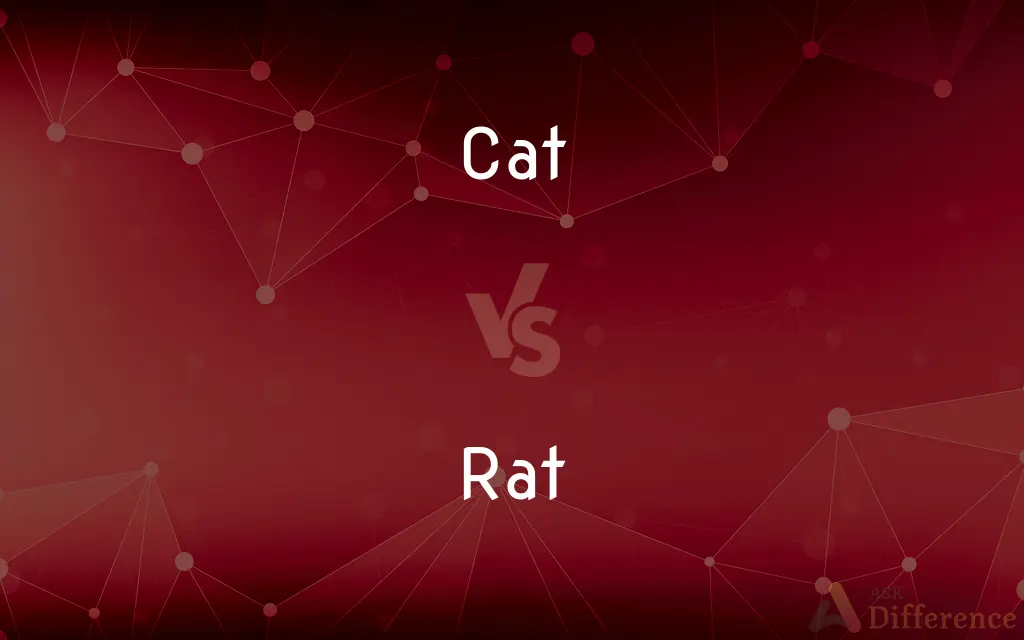Cat vs. Rat — What's the Difference?
By Maham Liaqat & Fiza Rafique — Updated on March 29, 2024
Cats are domesticated felines known for their hunting skills and companionship, while rats are rodents often associated with being pests but can also be pets.

Difference Between Cat and Rat
Table of Contents
ADVERTISEMENT
Key Differences
Cats, as domesticated animals, have a wide range of breeds with various characteristics, serving primarily as pets. They are known for their agility, hunting ability, and independence. Rats, on the other hand, belong to the rodent family and are often viewed negatively due to their association with disease and property damage. However, some species, like the fancy rat, are kept as pets for their intelligence and social nature.
Cats have a distinct carnivorous diet, relying heavily on meat to fulfill their nutritional needs. They possess sharp teeth and retractable claws tailored for hunting. Rats are omnivores, which allows them to consume a diverse diet, ranging from fruits and seeds to small animals, adapting easily to various environments.
The lifespan of a cat typically ranges from 12 to 15 years, depending on breed, lifestyle, and health care, showcasing their longevity as companion animals. Rats have a shorter lifespan, usually around 2 to 3 years, whether in the wild or as pets, influenced by their environment and breed.
Cats are celebrated for their role in human companionship, providing emotional support and displaying affection towards their owners. They are also appreciated for their ability to control pest populations. Rats, despite their reputation, can form strong bonds with their human caretakers and are valued for their intelligence, showcasing their capacity for tricks and problem-solving.
Cats communicate with humans and other animals through vocalizations like meowing and purring, body language, and scent marking. Rats communicate through high-frequency sounds, some of which are beyond human hearing, and use body language and scent marking for social interactions and expressing emotions.
ADVERTISEMENT
Comparison Chart
Classification
Domesticated feline
Rodent
Diet
Carnivorous, primarily meat
Omnivorous, diverse including seeds and animals
Lifespan
12 to 15 years
2 to 3 years
Role in Human Lives
Companionship, emotional support, pest control
Pets, some view as pests, known for intelligence
Communication
Meowing, purring, body language, scent marking
High-frequency sounds, body language, scent marking
Compare with Definitions
Cat
A cat that lives outdoors and has had little to no human contact.
Feral cats often form colonies around urban areas.
Rat
A small gnawing mammal of the order Rodentia, which includes rats.
Rats are among the most common types of rodents found in urban areas.
Cat
A small, domesticated, carnivorous mammal with soft fur, a short snout, and retractable claws.
The domestic cat curled up next to the fireplace.
Rat
A rat kept as a pet, known for its intelligence and social behavior.
She has two pet rats that can perform tricks.
Cat
In their role as hunters, cats often catch mice and birds.
The cat showcased its predator instincts by stalking the garden birds.
Rat
Rats are frequently used in scientific research due to their physiological similarities to humans.
Lab rats play a crucial role in medical studies.
Cat
Many people keep cats as pets for companionship.
Our family decided to adopt a cat from the local shelter.
Rat
Rats are known for their remarkable ability to survive in various environments.
Rats have proven to be survivors, thriving in both urban and rural settings.
Cat
Often referred to as the "king of cats," symbolizing strength and majesty.
In folklore, the lion is revered as the mightiest of all cats.
Rat
Viewed as a nuisance or pest in many societies due to their tendency to damage property and spread diseases.
The city has initiated a program to control the rat population.
Cat
The cat (Felis catus) is a domestic species of small carnivorous mammal. It is the only domesticated species in the family Felidae and is often referred to as the domestic cat to distinguish it from the wild members of the family.
Rat
Rats are various medium-sized, long-tailed rodents. Species of rats are found throughout the order Rodentia, but stereotypical rats are found in the genus Rattus.
Cat
A small domesticated carnivorous mammal (Felis catus), kept as a pet and as catcher of vermin, and existing in a variety of breeds.
Rat
A rodent that resembles a large mouse, typically having a pointed snout and a long tail. Some kinds have become cosmopolitan and are sometimes responsible for transmitting diseases.
Cat
Any of various other carnivorous mammals of the family Felidae, including the lion, tiger, leopard, and lynx.
Rat
A despicable person, especially a man who has been deceitful or disloyal
Her rat of a husband cheated on her
Cat
(Informal) A woman who is regarded as spiteful.
Rat
A person who is associated with or frequents a specified place
LA mall rats
Cat
A person, especially a man.
Rat
A pad used to give shape and fullness to a woman's hair.
Cat
A player or devotee of jazz music.
Rat
Used to express mild annoyance or irritation.
Cat
A cat-o'-nine-tails.
Rat
Hunt or kill rats
Ratting is second nature to a Jack Russell
Cat
A catfish.
Rat
Desert one's party, side, or cause
Many of the clans rallied to his support, others ratted and joined the King's forces
Cat
A cathead.
Rat
Shape (hair) with a rat.
Cat
A device for raising an anchor to the cathead.
Rat
Any of various long-tailed rodents resembling mice but larger, especially one of the genus Rattus.
Cat
A catboat.
Rat
Any of various animals similar to one of these long-tailed rodents.
Cat
A catamaran.
Rat
A despicable person, especially one who betrays or informs upon associates.
Cat
To hoist an anchor to (the cathead).
Rat
A scab laborer.
Cat
An animal of the family Felidae:
Rat
A pad of material, typically hair, worn as part of a woman's coiffure to puff out her own hair.
Cat
A domesticated species (Felis catus) of feline animal, commonly kept as a house pet.
Rat
(Slang) A person who frequently passes time at a particular place. Often used in combination
A rink rat.
Cat
Any similar animal of the family Felidae, which includes lions, tigers, bobcats, leopards, cougars, cheetahs, caracals, lynxes, and other such non-domesticated species.
Rat
To hunt for or catch rats, especially with the aid of dogs.
Cat
A person:
Rat
(Slang) To reveal incriminating or embarrassing information about someone, especially to a person in authority
Ratted on his best friend to the police.
Cat
(offensive) A spiteful or angry woman.
Rat
(Slang) To work as a scab laborer.
Cat
An enthusiast or player of jazz.
Rat
To puff out (the hair) with or as if with a pad of material.
Cat
(slang) A person (usually male).
Rat
(zoology) A medium-sized rodent belonging to the genus Rattus.
Cat
(slang) A prostitute.
Rat
(informal) Any of the numerous members of several rodent families (e.g. voles and mice) that resemble true rats in appearance, usually having a pointy snout, a long, bare tail, and body length greater than about 12 cm, or 5 inches.
Cat
(nautical) A strong tackle used to hoist an anchor to the cathead of a ship.
Rat
(informal) A person who is known for betrayal; a scoundrel; a quisling.
Rat bastard
What a rat, leaving us stranded here!
Cat
Short form of cat-o'-nine-tails.
Rat
(informal) An informant or snitch.
Cat
(archaic) A sturdy merchant sailing vessel now only in "catboat".
Rat
(informal) A scab: a worker who acts against trade union policies.
Cat
The game of "trap and ball" (also called "cat and dog").
Rat
(slang) A person who routinely spends time at a particular location.
Our teenager has become a mall rat.
He loved hockey and was a devoted rink rat.
Cat
The trap of the game of "trap and ball".
Rat
A wad of shed hair used as part of a hairstyle.
Cat
(archaic) The pointed piece of wood that is struck in the game of tipcat.
Rat
A roll of material used to puff out the hair, which is turned over it.
Cat
A vagina, a vulva; the female external genitalia.
Rat
Vagina.
Get your rat out.
Cat
A double tripod (for holding a plate, etc.) with six feet, of which three rest on the ground, in whatever position it is placed.
Rat
(regional) A scratch or a score.
Cat
(historical) A wheeled shelter, used in the Middle Ages as a siege weapon to allow assailants to approach enemy defences.
Rat
A place in the sea with rapid currents and crags where a ship is likely to be torn apart in stormy weather.
Cat
(computing) A program and command in Unix that reads one or more files and directs their content to the standard output.
Rat
(usually with “on” or “out”) To betray a person or party, especially by telling their secret to an authority or an enemy; to turn someone in.
He ratted on his coworker.
He is going to rat us out!
Cat
(slang) A street name of the drug methcathinone.
Rat
To work as a scab, going against trade union policies.
Cat
Abbreviation of catapult
A carrier's bow cats
Rat
(of a dog, etc.) To kill rats.
Cat
Abbreviation of catalytic converter
Rat
(regional) To scratch or score.
He ratted a vertical line on his face with a pocket knife.
Cat
Abbreviation of catamaran
Rat
To tear, rip, rend.
Ratted to shreds.
Cat
Abbreviation of category
Rat
Damn, drat, blast; used in oaths.
Cat
Abbreviation of catfish
Rat
One of several species of small rodents of the genus Rattus (formerly included in Mus) and allied genera, of the family Muridae, distinguished from mice primarily by being larger. They infest houses, stores, and ships, especially the Norway rat, also called brown rat, (Rattus norvegicus formerly Mus decumanus), the black rat (Rattus rattus formerly Mus rattus), and the roof rat (formerly Mus Alexandrinus, now included in Rattus rattus). These were introduced into America from the Old World. The white rat used most commonly in laboratories is primarily a strain derived from Rattus rattus.
Cat
Abbreviation of caterpillar
Rat
A round and tapering mass of hair, or similar material, used by women to support the puffs and rolls of their natural hair.
Cat
(slang) Any of a variety of earth-moving machines. (from their manufacturer Caterpillar Inc.)
Rat
One who deserts his party or associates; hence, in the trades, one who works for lower wages than those prescribed by a trades union.
Cat
A ground vehicle which uses caterpillar tracks, especially tractors, trucks, minibuses, and snow groomers.
Rat
In English politics, to desert one's party from interested motives; to forsake one's associates for one's own advantage; in the trades, to work for less wages, or on other conditions, than those established by a trades union.
Coleridge . . . incurred the reproach of having ratted, solely by his inability to follow the friends of his early days.
Cat
Abbreviation of computed axial tomographyOften used attributively, as in “CAT scan” or “CT scan”.
Rat
To catch or kill rats.
Cat
To hoist (the anchor) by its ring so that it hangs at the cathead.
Rat
To be an informer (against an associate); to inform (on an associate); to squeal; - used commonly in the phrase to rat on.
Cat
To flog with a cat-o'-nine-tails.
Rat
Any of various long-tailed rodents similar to but larger than a mouse
Cat
(slang) To vomit.
Rat
Someone who works (or provides workers) during a strike
Cat
To go wandering at night.
Rat
A person who is deemed to be despicable or contemptible;
Only a rotter would do that
Kill the rat
Throw the bum out
You cowardly little pukes!
The British call a contemptible person a `git'
Cat
To gossip in a catty manner.
Rat
One who reveals confidential information in return for money
Cat
To apply the cat command to (one or more files).
Rat
A pad (usually made of hair) worn as part of a woman's coiffure
Cat
To dump large amounts of data on (an unprepared target), usually with no intention of browsing it carefully.
Rat
Desert one's party or group of friends, for example, for one's personal advantage
Cat
Catastrophic; terrible, disastrous.
The weather was cat, so they returned home early.
Rat
Employ scabs or strike breakers in
Cat
Any animal belonging to the natural family Felidae, and in particular to the various species of the genera Felis, Panthera, and Lynx. The domestic cat is Felis domestica. The European wild cat (Felis catus) is much larger than the domestic cat. In the United States the name wild cat is commonly applied to the bay lynx (Lynx rufus). The larger felines, such as the lion, tiger, leopard, and cougar, are often referred to as cats, and sometimes as big cats. See Wild cat, and Tiger cat.
Laying aside their often rancorous debate over how best to preserve the Florida panther, state and federal wildlife officials, environmentalists, and independent scientists endorsed the proposal, and in 1995 the eight cats [female Texas cougars] were brought from Texas and released. . . . Uprooted from the arid hills of West Texas, three of the imports have died, but the remaining five adapted to swamp life and have each given birth to at least one litter of kittens.
Rat
Take the place of work of someone on strike
Cat
A strong vessel with a narrow stern, projecting quarters, and deep waist. It is employed in the coal and timber trade.
Rat
Give (hair) the appearance of being fuller by using a rat
Cat
A double tripod (for holding a plate, etc.), having six feet, of which three rest on the ground, in whatever position it is placed.
Rat
Catch rats, especially with dogs
Cat
An old game;
Rat
Give away information about somebody;
He told on his classmate who had cheated on the exam
Cat
Same as cat o' nine tails; as, British sailors feared the cat.
Cat
A catamaran.
Cat
To bring to the cathead; as, to cat an anchor. See Anchor.
Cat
Feline mammal usually having thick soft fur and being unable to roar; domestic cats; wildcats
Cat
An informal term for a youth or man;
A nice guy
The guy's only doing it for some doll
Cat
A spiteful woman gossip;
What a cat she is!
Cat
A whip with nine knotted cords;
British sailors feared the cat
Cat
A large vehicle that is driven by caterpillar tracks; frequently used for moving earth in construction and farm work
Cat
Any of several large cats typically able to roar and living in the wild
Cat
A method of examining body organs by scanning them with X rays and using a computer to construct a series of cross-sectional scans along a single axis
Cat
Beat with a cat-o'-nine-tails
Cat
Eject the contents of the stomach through the mouth;
After drinking too much, the students vomited
He purged continuously
The patient regurgitated the food we gave him last night
Common Curiosities
Do cats live longer than rats?
Yes, cats generally have a longer lifespan, living up to 12-15 years, compared to rats' 2-3 years.
Are rats always considered pests?
No, while often viewed as pests, rats can also be beloved pets or valuable research animals.
Can cats and rats get along?
With proper introduction and supervision, some cats and rats can coexist peacefully, but their natural instincts may pose challenges.
What do cats eat?
Cats are carnivores and primarily eat meat.
Is it common to have a rat as a pet?
Yes, many people keep rats as pets due to their intelligence and sociable nature.
How do rats communicate?
Rats communicate through high-frequency sounds, body language, and scent marking.
Are all cats carnivores?
Yes, all cats are obligate carnivores, requiring a diet primarily of meat.
Can rats be trained?
Yes, rats are highly intelligent and can be trained to perform tricks and tasks.
What do rats eat?
Rats are omnivores and have a varied diet, including seeds, fruits, and proteins.
How do cats communicate?
Cats communicate through vocalizations, body language, and scent marking.
Are all rats carriers of diseases?
Not all rats carry diseases, but they can transmit certain diseases to humans.
Do cats have a natural predator instinct?
Yes, cats possess a natural predator instinct, often displayed in their play and hunting behaviors.
What makes rats unique as pets?
Rats are appreciated for their intelligence, social bonds with humans, and ability to learn tricks.
Can cats be feral?
Yes, cats that live outdoors with little human contact are considered feral.
Why are cats considered good pets?
Cats are valued for their companionship, affectionate nature, and low-maintenance care.
Share Your Discovery

Previous Comparison
Wig vs. Wag
Next Comparison
Stereotype vs. GeneralizationAuthor Spotlight
Written by
Maham LiaqatCo-written by
Fiza RafiqueFiza Rafique is a skilled content writer at AskDifference.com, where she meticulously refines and enhances written pieces. Drawing from her vast editorial expertise, Fiza ensures clarity, accuracy, and precision in every article. Passionate about language, she continually seeks to elevate the quality of content for readers worldwide.















































